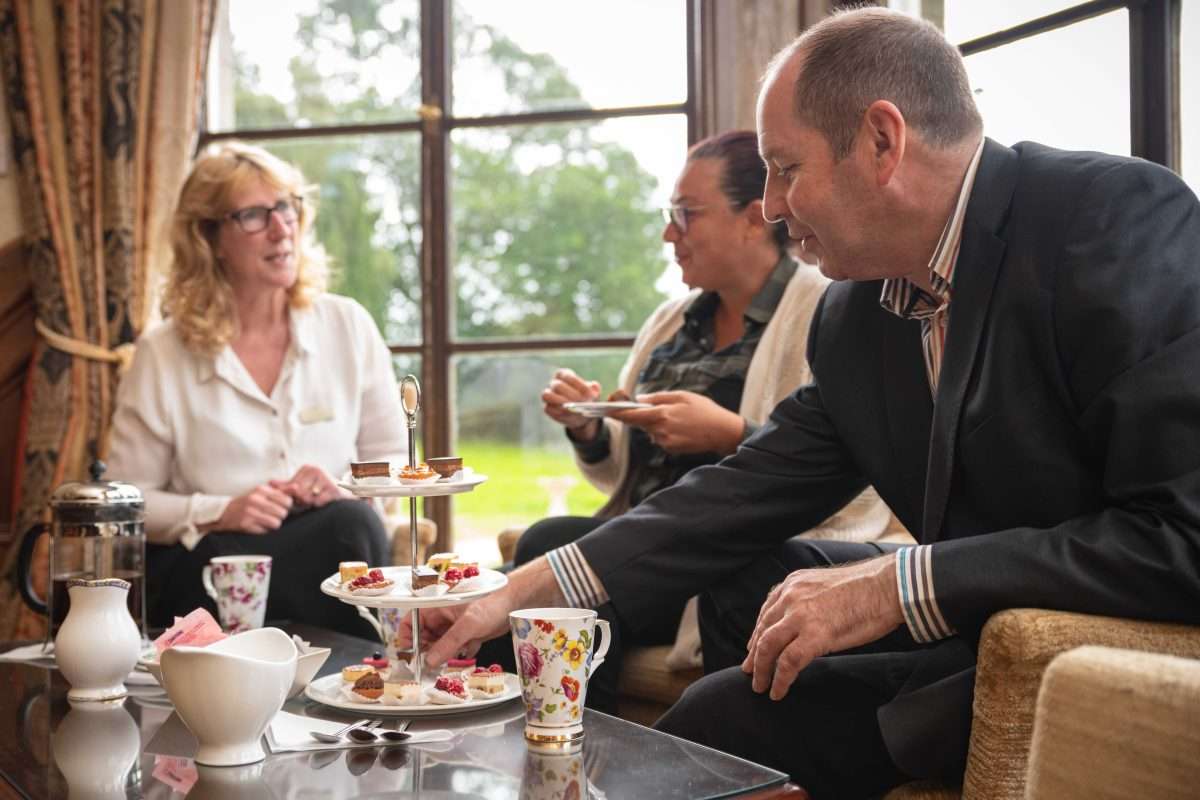
Tailored Long-Term Treatment Plans
Castle Craig provides high-quality care for patients struggling with drug and alcohol addiction. Located in peaceful and scenic countryside, our addiction treatment centre provides a calm and therapeutic environment ideal for recovery. We design personalised treatment programmes tailored to your specific needs, featuring flexible different therapy methods and evidence-based treatments. Our holistic approach addresses both the physical and mental aspects of addiction, guided by an experienced, multidisciplinary team. Surrounded by nature and wildlife, our setting promotes healing and renewal, creating a supportive space for lasting recovery.
If you’re seeking a way forward for yourself or a loved one, we’re here to help. Our addiction rehabilitation programmes are carefully crafted to offer the best chance of restoring health and positivity. Contact our team today to discover how Castle Craig can guide you towards a more fulfilling future.
What is Long-Term Drug and Alcohol Rehab?
Long-term drug and alcohol rehab is an addiction treatment programme typically designed to provide extended care for individuals struggling with severe addiction. Individually tailored programmes could last beyond a few months, offering a structured environment where patients can focus on recovery. The recovery plans concentrate on not only the addiction itself but also the causes and behaviours that contribute to it.
A longer time spent in dedicated recovery allows the individual to develop healthier habits, learn new coping strategies and rebuild their lives away from addiction. The extended duration of rehab offers opportunities to work through specific substance misuse challenges at a deeper level, bolstered by support from professional specialists and therapists in a secure and supportive setting.
What is a Long-Term Inpatient Rehab Centre?
A long-term inpatient rehab centre offers extended residential care for individuals recovering from addiction. Patients could reside at a facility for several months, receiving consistent support and guidance in an environment designed to promote recovery and personal transformation.
Individuals benefit from a comprehensive approach that addresses physical, emotional and mental health challenges linked to addiction. Tailored treatment plans, evidence-based therapies, medical oversight and a supportive peer community provide the resources necessary for developing healthier habits and achieving lasting recovery.

Start Your Recovery at a Residential Rehab Today
Free Substance Addiction Assessment
Castle Craig is here to support you on your path to recovery. We offer free drug and alcohol addiction assessments as part of our admissions process, providing a safe and confidential way to better understand your needs. Our professional team is ready to guide you through this first step with clarity and understanding.
Following your free assessment, we can develop a tailored residential treatment plan designed specifically for you. With a focus on personal care, our expert team ensures treatment aligns with your unique challenges and recovery goals. Call us today on 01721 546 263 to book your assessment or to find out more about our evidence-based treatment.
Free Addiction Assessment
Taking the first step and asking for help can feel daunting, but our team is here to assist you.
Does Extended Stay Residential Treatment Work?
Spending 90 days or more in a residential drug and alcohol rehab centre often leads to better recovery outcomes. A longer stay gives patients the chance to immerse themselves in structured treatment, tackle underlying issues and build resilient routines within a nurturing setting.
The effectiveness of extended treatment is influenced by factors such as the type of substance, the severity of addiction and the therapies provided. Personal motivation and access to professional care and resources are also vital in determining long-term success.
Recovery Programme Timeframes that are Considered Long-Term
While you may have a preferred timeframe for recovery in mind, it is always best to follow the guidance of a qualified addiction treatment professional who can assess your situation comprehensively. A careful evaluation of your specific challenges and goals makes it far more likely that the selected programme will offer the best route to lasting recovery.
At Castle Craig, we work alongside you to draw up a unique programme and timeframe that addresses your particular needs while maximising your chances of success. It could be that the recommended timeframe qualifies as long-term addiction rehab, but it is always essential to work with our specialists and undergo an initial assessment to determine what will work best for you.
-
28-day+ Addiction Rehab Programmes
A 28- or 30-day drug and alcohol rehab programme can be a good starting point for many people beginning their recovery from addiction. It provides a structured and focused approach that includes thorough assessments, medically managed detoxification and therapy sessions to address key challenges in overcoming substance use. However, for those with more severe addictions, healthcare professionals might recommend longer treatment durations to ensure more comprehensive care and support, allowing for deeper recovery work and a stronger foundation for lasting sobriety.
The short yet intensive nature of 30-day addiction rehab programmes makes them well-suited for those with a moderate level of dependence or limited time availability. A solid foundation for recovery, with encouragement for commitment and ongoing progress, is offered throughout the period. Patients are often offered continuing care upon completion, designed to support a lasting recovery and return to daily life.
-
60-day, 90-day and 120-day Recovery Programmes
Addiction recovery programmes lasting 120, 90, or 60 days give individuals more time to address the underlying causes of their addiction. In-depth therapy, skill-building and extensive support are key parts of extended care plans for drug or alcohol dependency. The longer duration of rehab programmes can be ideal for working on deeper behavioural change and building up stronger coping mechanisms.
Extended recovery programmes provide abundant time to develop sustainable strategies for maintaining sobriety. An individuals’ specialised treatment plan is designed to make sure that their own specific and complex needs are met throughout their stay. By utilising holistic recovery programmes and personalised therapy sessions, long-term addiction treatment programmes can result in significantly higher chances of success.
-
Extended Stay Residential Rehab
Extended stay residential rehab offers a supportive environment for individuals who require a prolonged recovery period. Medically managed detox and rehabilitation programmes are often recommended for severe addiction cases or complex challenges, such as a dual diagnosis. A dual diagnosis is when a patient is diagnosed with a substance addiction alongside other mental health disorders such as anxiety or depression.
Extended alcohol or drug recovery programmes concentrate on building resilience and addressing patterns that contribute to addiction. Patients affected by severe substance addiction and other mental health issues will benefit from continuous access to support, professional care and a range of therapies. The prolonged care plan provides a greater chance of their being fully equipped to rebuild their lives when they leave rehab.
-
Aftercare and Continuing Care
Aftercare and continuing care are vital components of a successful recovery plan. The ongoing support services provided post-rehab are designed to help individuals maintain their sobriety and prevent relapse after completing a rehab programme. Typical aftercare includes ongoing counselling, peer support groups, and access to resources that support healthy living.
Long-term recovery requires consistent and reliable support. Castle Craig offers aftercare options, including family counselling, relapse prevention planning and alumni networks to provide patients with a strong safety net. Continuing care ensures that recovery is encouraged and guided during each phase of the recovery process.


Do Long-Term Drug and Alcohol Rehabs Offer Mental Health and Substance Use Disorder Treatment?
Some treatment centres may focus exclusively on mental health or substance use disorders, so finding one that suits your needs is essential. A rehab facility that provides dual diagnosis treatment with integrated care for those dealing with both conditions at the same time is often valuable for effective recovery.
Castle Craig provides dedicated care for individuals struggling with both addiction and mental health conditions. The team is highly experienced in supporting those with dual diagnoses, ensuring personalised treatment that addresses all aspects of a patient’s challenges. Each programme is carefully designed to promote both emotional and physical wellness.
Evidence-based therapies for addiction are paired with mental health support to create a positive and well-rounded treatment plan. Approaches such as cognitive-behavioural therapy (CBT) and trauma counselling focus on the root causes, equipping patients with the tools required for sustainable recovery.
Our qualified professionals at Castle Craig are committed to enhancing every aspect of a patient’s well-being. By treating mental health conditions alongside addiction, the team works with individuals to help them build a healthier future and regain control over their lives.
Long-Term Drug and Alcohol Rehab Centre in the UK
Finding the right long-term rehab centre can be a crucial step on the path to recovery. With exceptional facilities and highly qualified staff, Castle Craig provides comprehensive addiction treatment programmes tailored to individual needs. Below, you’ll find essential information to help you take the first steps toward a healthier, addiction-free future.

Contact Castle Craig Residential Rehab Centre
Castle Craig is situated in the serene countryside of West Linton, near Edinburgh in the UK, EH46 7DH. Surrounded by the tranquillity of nature, our stunning setting provides an ideal environment for healing and recovery. Private, quiet and secluded, we provide a naturally therapeutic backdrop of nature and wildlife that relieves you from outside troubles and inspires hope every step of the way.
Find Us
01721 546 263
info@castlecraig.co.uk
Castle Craig,
West Linton, Edinburgh, United Kingdom, EH46 7DH
For more information about our residential treatment for drug and alcohol addiction, call 01721 546 263 today. Our team is ready to assist you with any queries and guide you in making the best choice for your recovery needs. Take the first step by reaching out and discover how Castle Craig can support you on your journey to sobriety.
-
How to Find Long-Term Drug and Alcohol Treatment Near You
Searching for the right long-term addiction treatment centre may seem overwhelming at first, but knowing what to look for makes the process much simpler. Below are key points to consider when evaluating your options for a rehab facility.
- Use Search Engines for Local Rehab Options: Begin your search online by entering location-specific queries like “drug and alcohol rehab centres in the United Kingdom,” “long-term rehab programmes in Scotland,” or “addiction treatment in Edinburgh or Glasgow.” Including your city or region can help narrow down local facilities that are easier to access.
- Ask if They Accept Private Health Insurance: Confirm whether the rehab centre accepts private health insurance to help cover the cost of treatment. Some facilities work with insurers to create affordable plans for patients. Making sure your insurance provider covers the programme can ease financial concerns.
- Check for Dual Diagnosis Treatment: If you or a loved one have co-occurring mental health disorders, look for centres offering dual diagnosis treatment. Addressing mental health conditions alongside addiction is essential for lasting recovery. Castle Craig, for instance, has extensive experience in treating dual diagnoses.
- Ask About Their Experience and Credentials: Enquire about the centre’s years of operation and the credentials of its staff. Reputable facilities employ certified therapists, psychiatrists and medical professionals to provide an overall excellent service of care during your stay.
- Ask About Their Residential Treatment Amenities: Consider the amenities available, such as private or shared rooms, recreational areas, fitness facilities and meal plans. The overall comfort and experience of your stay can be greatly enhanced by the available amenities, allowing you to focus entirely on recovery in a supportive environment.
Find Out About Our Long-Term Addiction Recovery Treatment
Castle Craig offers free addiction assessments to help you take the first step towards recovery. By speaking with our expert team, you can gain a better understanding of your personal challenges and explore the most suitable treatment options. Our compassionate staff are here to guide you every step of the way.
We specialise in creating tailored treatment plans designed to meet your unique needs. During your consultation, our team will provide detailed information about our programmes and offer a more accurate idea of pricing for a residential retreat. Call us today on 01721 546 263 to start your journey to lasting recovery.
Timeframe-Based Addiction Treatment Guides
Long-Term Residential Treatment | 3 Month Inpatient Rehab | 2 Month Inpatient Rehab | Short-Term Residential Rehab | 1 Month Inpatient Rehab | 2 Week Rehab
Treatment Options at Long-Term Drug and Alcohol Rehab Centres
Even though addiction recovery centres offer a variety of treatment options, residential programmes consistently demonstrate high success rates. By providing a structured environment, access to round-the-clock care and evidence-based therapies, residential rehabilitation centres help patients achieve and sustain long-term recovery.
Many drug and alcohol rehab centres incorporate treatments such as medically managed detoxification, individual and group therapy, mental health counselling and holistic activities like yoga or art therapy. To explore the most suitable treatment options for your needs, contact Castle Craig today. Our team will guide you through your choices and develop a personalised recovery plan tailored to your unique circumstances.
-
Long-Stay Inpatient/Residential Addiction Treatment
Long-stay inpatient or residential addiction treatment provides individuals with a safe and structured environment to focus entirely on their recovery. By residing within the facility, patients are offered continuous medical and emotional support, free from the triggers and distractions of their everyday lives. The extended care approach allows for deeper healing and a more comprehensive rehabilitation experience.
Extended inpatient programmes are particularly beneficial for those with severe or long-standing addictions. The longer timeframe for rehab enables a thorough medically managed detox process, followed by specialised therapies and skill-building exercises. Patients then have a greater chance to meet the possible causes of their addiction, while building up new strategies to engage in and maintain a healthy and sober lifestyle.
-
Long-Stay Dual Diagnosis Treatment
Dual diagnosis treatment is essential for individuals who are battling both addiction and co-occurring mental health conditions, such as anxiety, depression or PTSD. Long-stay dual diagnosis programmes take a comprehensive approach by addressing a patient’s interconnected challenges simultaneously. By treating both addiction issues and mental health conditions together rather than separately, the chances of achieving lasting recovery are improved.
Through a combination of evidence-based therapies, including psychiatric support and addiction counselling, patients in a dual diagnosis programme gain the tools to manage their mental health while maintaining sobriety. Long stays allow sufficient time for individuals to stabilise, learn effective coping mechanisms and build healthier routines that support their overall well-being.
-
Individual Therapy and Counselling
One-to-one therapy is a key part of addiction treatment, offering patients the opportunity to explore personal challenges in a confidential, one-on-one setting. Therapy sessions and individual counselling help patients uncover the root causes of their addiction, identify triggers and work towards healthier thought patterns and behaviours. Therapists use evidence-based methods, such as cognitive-behavioural therapy (CBT), to provide meaningful and lasting change.
For long-term counselling to be successful there needs to be a strong relationship of trust between the therapist and patient, creating a secure space for deeper personal reflection and growth. Regular progress reviews and extended care for addiction make sure that the therapy moves forward with the patient’s needs, helping them to their recovery goals. The trusting and personalised care approach could make an addiction-free and healthy future for the patient more likely and sustainable.
-
Group Therapy and Peer Support
Group therapy provides a sense of belonging and shared understanding among individuals in recovery. By coming together in a safe, moderated environment, participants can share their feelings and experiences and learn from each other. Group sessions often complement individual therapy, providing an additional layer of support and accountability.
Peer support is equally vital in building motivation and emotional resilience during the recovery process. Forming connections with others who share similar challenges creates a strong support network that extends beyond the treatment period. Peer relationships can bring a sense of hope and encouragement, boosting the idea that successful treatment is possible within a complementary and supportive environment.

Does Private Health Insurance Cover Long-Term Rehabilitation?
Yes, some private health and medical insurance policies do offer some level of cover for addiction recovery treatment. The extent of private health insurance coverage for long-term rehabilitation depends on various factors such as your specific policy, the type of insurance, the treatment programme selected and individual circumstances. It’s important to review your insurance plan and confirm the details with your provider.
If you have coverage, Castle Craig accepts private health insurance from many major providers, and can assist you with our insurance admissions process once you have been authorised for treatment with us. Our experienced team can guide you through your treatment plan and help clarify your options. Call us today on 01721 546 263 to find out about all our payment options.
Private Alcohol and Drug Rehab Services
Private Addiction Rehab | Accredited Rehab Facility | Discreet Rehab Programme | Evidence Based Addiction Treatment | Luxury Rehab Centers | Residential Addiction Rehab | Inpatient Addiction Treatment | Residential Detox Center | Addiction Recovery Retreats | Medically Managed Detox
How Much Does Comprehensive Long-Term Rehab Cost?
The cost of long-term rehab in the UK typically ranges from £650 to £1500 per day, translating to approximately £18,000 to £40,000 for a 28-day programme. For a longer stay, this can total around £27,000 to £60,000 for a six-week programme. The above figures provide an estimate, helping you understand the financial investment required for quality care.
Costs can vary based on the level of care, specific treatment lengths and individual needs. For a more precise understanding of our pricing, we recommend contacting Castle Craig by filling out our online form. Our team will get back to you to provide clear and accurate information about the costs of our different residential rehab durations.
Questions About Long-Term Residential Rehab?
Contact us to discuss your treatment needs with a licensed clinician.
Long-Term Alcohol and Drug Rehab Admissions and Treatment Process
Long-term rehabilitation programmes are designed to address the specific needs of each patient, creating a personalised plan for recovery. Below is a breakdown of the admissions process to help you understand the steps involved.
- Initial Inquiry and Pre-Screening: An initial consultation is needed to assess your medical history, addiction severity and treatment goals. It helps us determine if Castle Craig is the right fit for you.
- Medically Managed Detox for Substance Addiction: For those requiring detox, a safe, medically managed withdrawal process can be offered using medical care to manage symptoms.
- Evidence-Based Addiction Therapy and Counselling: Patients engage in proven therapeutic methods such as cognitive-behavioural therapy (CBT) to address addiction triggers and develop coping strategies.
- Holistic and Wellness Activities: Complementary therapies, like yoga, art therapy, and mindfulness exercises, support mental and physical well-being throughout the recovery process.
- Life Skills and Relapse Prevention Training: A focus on developing practical life skills and relapse prevention strategies equips patients with the tools needed for a successful transition back to everyday life.
- Aftercare and Ongoing Support: Continuing care plans are established to help maintain sobriety, providing access to support groups and follow-up services after leaving the residential programme.

Contact Castle Craig Today
Take the first step towards a healthier future by contacting Castle Craig. Our compassionate team can provide information about our long-term drug and alcohol addiction rehab treatment, admissions process and how to book your free addiction assessment.
Call us today on 01721 546 263 or fill out our online form here. We’re here to help you or your loved one take the next step towards lasting recovery.
Free & Confidential Assessment
Compassion, expertly delivered evidence-based practices and a patient-centred approach are at the heart of our treatment model. Request a call-back from one of our professionals on any day of the week.
-
Statistics on Long-term Substance Misuse Rehabs
- 73.4%* of patients treated at Castle Craig were abstinent from all drugs or alcohol at follow-up (approximately one year later).
- 91.8%* of patients reported either reduced alcohol or drug use or complete abstinence.
- 81.6%* of patients were classified as having a “good outcome” by independent reviewers.
- 48% of individuals who exited the drug and alcohol treatment system in 2017-2018 successfully completed their treatment, free from dependence.
- Alcohol-only treatment clients had the highest success rate, with 61% completing treatment successfully.
- Patients receiving the recommended 90 days of medically assisted treatment show significantly better outcomes in long-term recovery.
- Those who continue with recovery treatment for three years or more have lower relapse rates compared to those on shorter programmes.
*survey sampled 158 respondents.